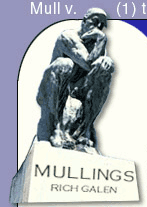|
|

|

A Witting Misstatement
 Wednesday October 4, 2000
Wednesday October 4, 2000
- About three quarters of the way into the debate, Governor George W. Bush gave credit to the Federal Emergency Management Service (FEMA) for their work in Texas during fires and floods in Parker County.
- In typical fashion, Vice President Al Gore said he had traveled to see the damage with FEMA director James Lee Witt, "I was down there when the fires broke up."
- Carl Cameron, of Fox News first reported that Gore had not, in fact, been to Texas with Witt to look at the damage in Parker County.
- Gore could have accepted the compliment and let it go, but he couldn't do it. He had to invent a personal connection which did not exist.
- But let's back up to the beginning:
- The filing center for The Big Debate was an ice hockey rink. An estimate of over 700 reporters in attendance is not an exaggeration. An estimate of over 700 Congressmen, Senators, Governors, staff, and political operatives spinning those reporters is only just slightly an exaggeration.
- The pre-game spin was interesting in that no one - including the participants - had any idea what was going to happen.
- The press corps, many times, falls in love with a theory and then propounds that theory until it is either proven true or false. There is, generally, not much difference in the press corps' attitude toward its theory no matter what happens. The important thing is that a theory exists.
- The press had no theory about The Big Debate. There was no consensus as to what the strategy of each candidate should be or what the potential outcomes would be of said strategies.
- Here was my theory: The strong bounce back of Governor Bush after a bad month indicated a significant number of Americans want to be in favor of Bush for President. Those Americans, my theory goes, want to be shown that Governor Bush has the capacity - defining capacity any way you want - to be their President.
- The strategy of the Bush campaign, then, was to walk the line between presenting a broad optimistic view of America in the 21st century and presenting enough detail to prove he has a grasp of the ins and outs of the programs under discussion.
- The Gore campaign had the opposite strategy. He had to walk a line between showing he is the best person to handle the details of complex issues without drowning viewers in a sea of semi-colons and decimal points.
- Bush did show he has an understanding of the issues under discussion. He did show he has an optimistic view of America's future. And, he didn't get dragged down into the kind of detailed arguments which Al Gore successfully hauled Bill Bradley into.
- Vice President Gore didn't fail in this debate. For the most part he caught himself when he began to do his wonk act. For the most part he avoided talking to the audience as if we were third graders - except when the question turned to the Clinton/Gore fund raising scandals. For the most part he demonstrated his extraordinary ability to quote facts and figures to support his case.
- To a great degree, then, I think they both accomplished their goals.
- About half the reporters I talked to agreed with my assessment. About half thought that neither Bush nor Gore did what they had set out to do: That Bush was not specific enough and that Gore did nothing to make himself more likeable.
- In either case, I believe, the tie goes to Bush as the presumed weaker debater.
- We'll see what the polling shows, but my sense is a significant number of people who were undecided before The Big Debate will come down on the side of George W. as the person they think will make the better President.
- The post-game spin was fairly typical. Both sides had their people in the rink with signs held aloft by volunteers with the name of the spinner so reporters could gather near the person from whom they needed a quote.
- Bob Shrum, chief communications guy for the Gore camp said his guy had won because, "People care about this in terms of very specific issues," reiterating the basic Gore strategy that this campaign will be won or lost by its ability to convince voters it is the grasp of the "specific[s]" of the issues which is most important.
- Stuart Stevens, the Bush media maven said he thought his guy had won because Bush showed "he was smart, not overly smooth, and much more genuine," than Gore. That being the basic Bush strategy that character and personality will trump Gore's specificity.
- Bush by a field goal.
-- END --
Copyright © 2000 Richard A. Galen



Current Issue |
Secret Decoder
Ring | Past
Issues | Email
Rich | Rich
Who?
Copyright �1999 Richard
A. Galen | Site design by Campaign
Solutions. | |
|

